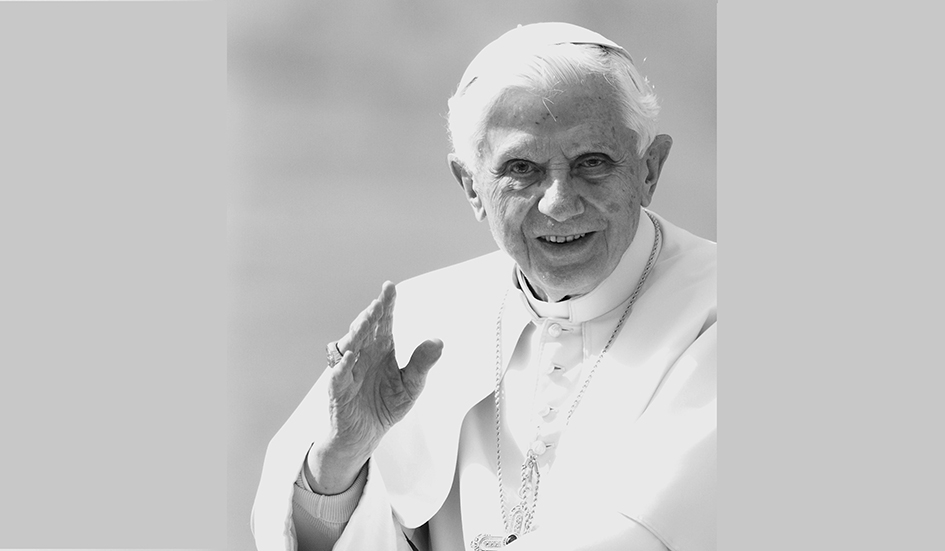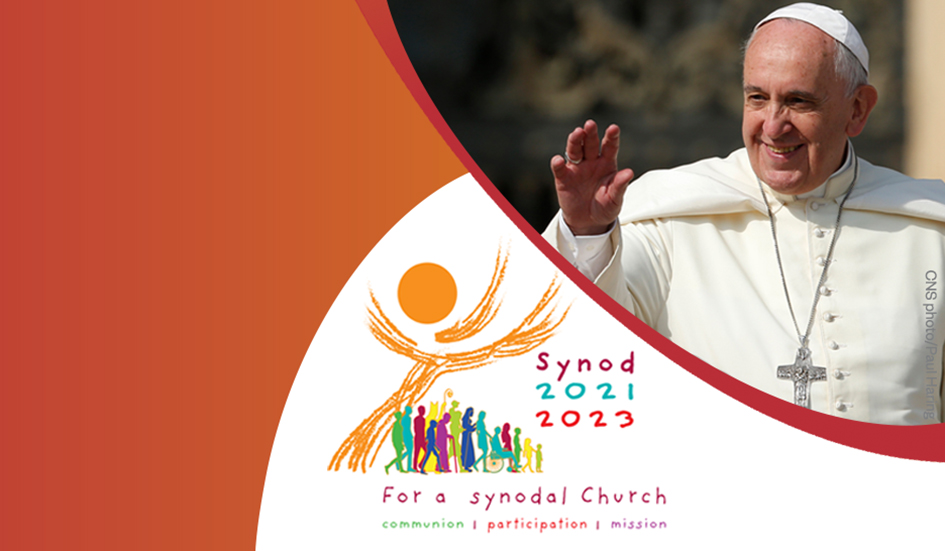The article picture shows the statue of St. Henry in Rome.
Some Visions
Editorial, Fides 1/2023, p. 2, 20 January 2023.
In many ways, our diocese is in a strange in-between state. We don’t have a bishop, haven’t had one for over three and a half years. The departure of our Bishop Emeritus Teemu [to Germany] further emphasizes the feeling of having no bishop. The diocesan administrator cannot completely replace the bishop, because his primary task is to take care of the necessary running matters but not to actually change anything. So we are in a state where everything continues as before – to the extent possible – and even if changes are needed, nothing can be changed.
I believe many Catholics have similar feelings about the death of Pope Benedict. The first pope emeritus of our time and all of modern history offered a sense of continuity with his mere existence and illuminated trust in the Church and Christ with his example of quiet wisdom of old age, experience and a reassuring worldview. The coming years and even decades will show us how significant the legacy of Pope Benedict and definitely also of the theologian Joseph Ratzinger really is. A lot of praises have already been uttered, and for good reason.
While we in Finland are still waiting for a new bishop, we can nevertheless be happy that the church and parishes are working in our country. We can rejoice in the fact that we have priests, sisters and lay people dedicated to their mission, relatively many Masses in many different places. Of course, the distances are long and there are plenty of challenges, but yes, some kind of connection is possible and the sacraments are available.
Especially during the currently celebrated ecumenical week of prayer [Jan. 18-25], we can also be grateful that relations between Christians are – despite the theological differences – exceptionally good. It is important to keep in mind that the broader the common front of all the baptized is, the better the message of Christianity is seen and heard even outside the borders of the different denominations, exactly where the primary target of evangelization is.
Marko Tervaportti
Editor
[Translated by Google]
Farewell Mass of Bishop Emeritus Teemu Sippo


The Mass for the Feast of Epiphany was celebrated with some melancholy, as it was also the farewell Mass of Bishop Emeritus Teemu Sippo. The week following the Mass the Bishop moved to the monastery of the Sacred Heart, in which he had also lived while studying in Freiburg. The Cathedral was full of guests, and after the Mass the farewell party continued in the parish hall.
Bishop Teemu’s Greetings from Freiburg
Bishop Emeritus Teemu Sippo SCJ has arrived in Germany and sent the following greetings:“My brother Totti and I left Vuosaari on Jan. 12. The boat trip to Travemünde in Germany took 30 hours, and we arrived late in the evening on Jan. 13. We then drove ca. 850 kilometres and arrived at the Sacred Heart monastery at 9 o’clock the following day. Greetings to everyone from Freiburg!
Pope Emeritus Benedict dies

Declaration of the Director of the Holy See Press Office, Matteo Bruni, 31.12.2022:
“With sorrow I inform you that the Pope Emeritus, Benedict XVI, passed away today at 9:34 in the Mater Ecclesiae Monastery in the Vatican.”
A Requiem Mass was offered in St. Henry’s Cathedral for the repose of soul of the departed Pope Emeritus on Wednesday Jan. 4th at 18.00. During Mass and until the evening of the following day there was a book available in the Cathedral in which anyone wishing to do so could write one’s condolences as a way of saying goodbye, and in order to show one’s respect for the memory of Pope Benedict.
The Funeral Mass for the Pope Emeritus was offered on St. Peter’s Square in the Vatican on Thursday Jan. 5th at 9.30, local time. He was buried in the crypt of St. Peter’s Basilica. May he rest in peace.
Fr. Zenon Strykowski SCJ returns to Poland

Fr. Zenon Strykowski SCJ, who has worked in Finland for over 20 years, e.g. in Turku, Tampere and Helsinki, returns to Poland in the beginning of January. Meanwhile, right after Fr. Strykowski’s departure, Martti Savijoki SCJ, who received his priestly ordination last year, will begin his ministry in in Finland in St. Mary’s parish.
Cardinal Pell dies
Sr. Mary Venard CPPS to turn one hunded

Sr. Mary Vénard CPPS will turn 100 on Feb. 22.
Among the many celebrations, and chances to congratulate Sr. Mary, are the following:
– Church coffee after the High Mass at St. Mary’s church on Sunday 29.1.
– African Mass in Kallio Church on Sunday 12.2. at noon
– A celebration for friends of Sr. Mary at the English School on 17.2. (By invitation, only.)
Pope’s Prayer Intentions for 2023
January
For educators
We pray that educators may be credible witnesses, teaching fraternity rather than competition and helping the youngest and most vulnerable above all.
Homily of Pope Francis at the Funeral Mass of Pope Emeritus Benedict
Pope Emeritus Benedict XVI buried
Biography of Pope Emeritus Benedict XVI
Spiritual Testament of Pope Emeritus Benedict XVI
Message of Pope Francis for the 56th World Day of Peace
Opinion: How to Continue the Synodal Process

I find it difficult to imagine that the ongoing synodal process now extended by Pope Franciscus for a year can be completed during his time. The process has been difficult in some countries. In other countries and perhaps completely uninteresting and perhaps irrelevant to most Catholics in the world. They simply do not care about the church and how it should develop to advance the Christian message in our time and in the future. Only around a tenth of Catholics have so far bothered to participate in the process. The reasons for this are many. I can imagine that many Catholics did not know the whole process or in what way they could participate in it. It is then a question of a communication gap. Another reason is that the responsibility for participation has been given to each individual Catholic who could form groups for participation. You don’t know how to organize yourself.
Perhaps many Catholics simply do not care about how the Church should develop in the future. You are satisfied with what you have. Good then. It could also be a question of the lack of knowledge about what the Catholic Church actually stands for. We may not know enough about our own faith. Because of this lack of knowledge, one does not “dare” to express one’s opinion. No training or even systematic information in the form of seminars or spiritual “mentor” has been set up. Freedom of opinion applies.
Of course, it is difficult to activate 1.4 billion Catholics from all over the world in such a demanding and extensive process as the synodal process is. In practice, this has led to some active groups taking over parts of the process. The synodal process has been “radicalized” where these groups put forward their views regarding issues such as the role of women in the church, especially the question of the priesthood, same-sex marriage, abortion and euthanasia and other issues that go against basic faith issues. It has developed into a new reformation where “everything” is questioned. This development has led to contradictions and group formation in many countries such as Germany. In other countries, the discussion has become passive. One simply does not want to express a position on such sensitive issues. The church has become split into three groups; a radical group that wants to change basic beliefs and traditions, another group that opposes this and sticks to what was decided during the Second Vatican Council in the early 1960s, and a third group that simply does not care about the current Church future development.
It is clear that Pope Francis is worried. The synodal process is at a standstill. But it has highlighted major contradictions within the church’s teaching between those who want to radically “reform” the church and its beliefs and those who want to preserve the status quo. There is a risk that some groups will leave the church to found their own “catholic” “churches”. The synodal process has thus led to a certain crisis within the church. This crisis does not go away just because it has now been decided to extend the time for giving comments.
In my opinion, we should re-analyze the texts and changes decided upon during the Second Vatican Council. The material is extremely rich and provides opportunities to develop the church without therefore trying to incorporate all believers into a development process. Guidance from the church via e.g. seminars and written practical information should perhaps be distributed in the parishes. In Finland, e.g. Academicum Catholicum or Studium Catholicum take the initiative in this.
Pope Francis has initiated a process that now threatens fundamental structures within the church and that could, in the worst case, lead to division. He will hardly come because his age to bring this process to an end. The synodal process will be with us for a long time. Of course, a future pope could cancel part of the process. But Pandora’s box is now open.
We Finnish Catholics have given our comments to the process. This has been informed to everyone via Catholic Information Centre KATT. Now we have an opportunity to come up with new initiatives and ideas regarding the way the church can develop in the future. We should use this opportunity. We are a multicultural church with many new members. Their thoughts should be incorporated into our comments. Do our Filipinos, Africans and Vietnamese actually have no opinion on how the church should develop? Is it actually the case that only a few “original” Finnish Catholics have opinions about this?
Jan-Peter Paul
[Translated by Google]